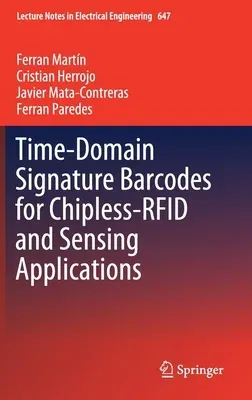Ferran Martín
(Author)Time-Domain Signature Barcodes for Chipless-Rfid and Sensing Applications (2020)Hardcover - 2020, 2 February 2020

Qty
1
Turbo
Ships in 2 - 3 days
In Stock
Free Delivery
Cash on Delivery
15 Days
Free Returns
Secure Checkout

Part of Series
Lecture Notes in Electrical Engineering
Print Length
142 pages
Language
English
Publisher
Springer
Date Published
2 Feb 2020
ISBN-10
3030397254
ISBN-13
9783030397258
Description
Product Details
Book Edition:
2020
Book Format:
Hardcover
Country of Origin:
NL
Date Published:
2 February 2020
Dimensions:
23.39 x
15.6 x
1.12 cm
ISBN-10:
3030397254
ISBN-13:
9783030397258
Language:
English
Location:
Cham
Pages:
142
Publisher:
Weight:
403.7 gm